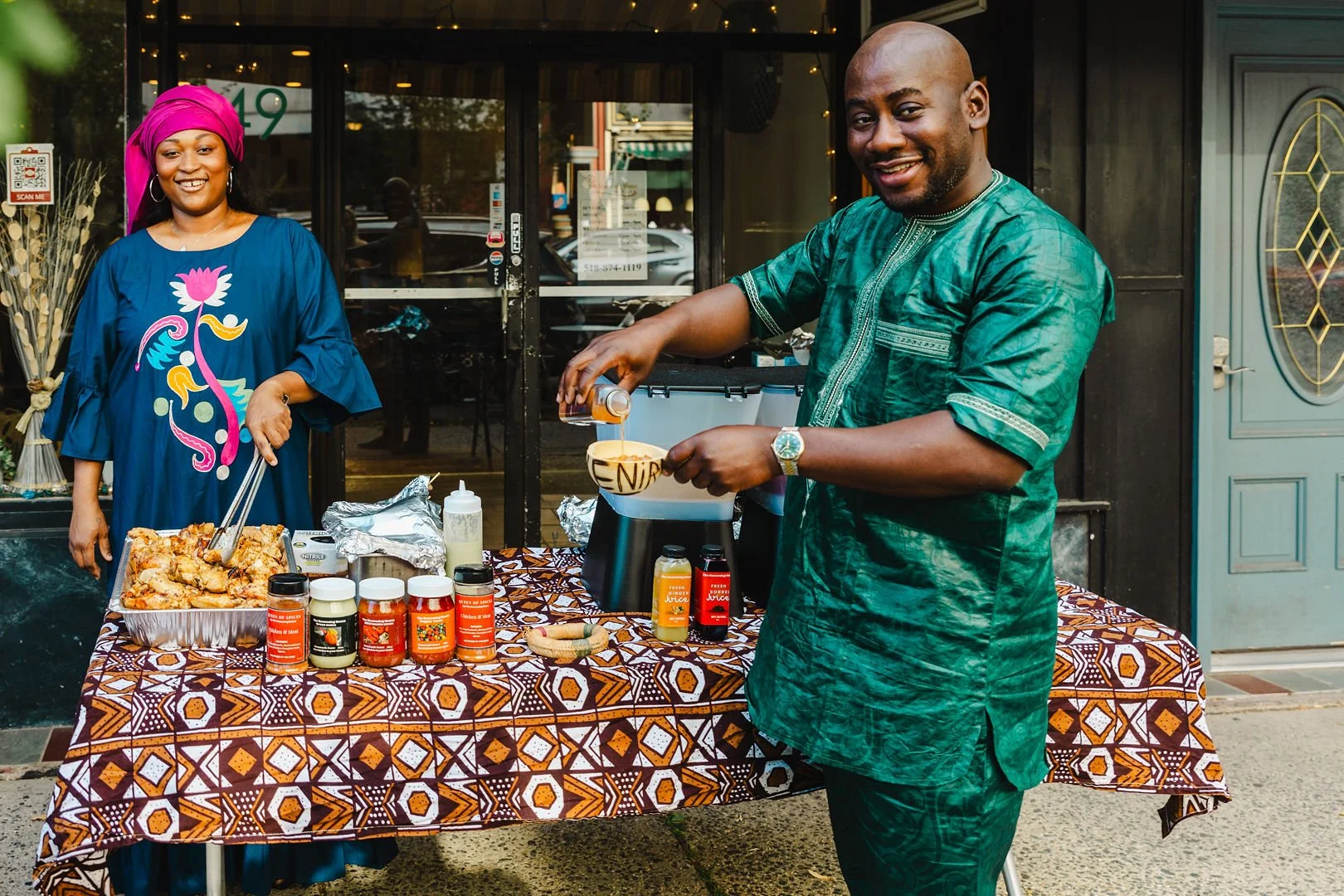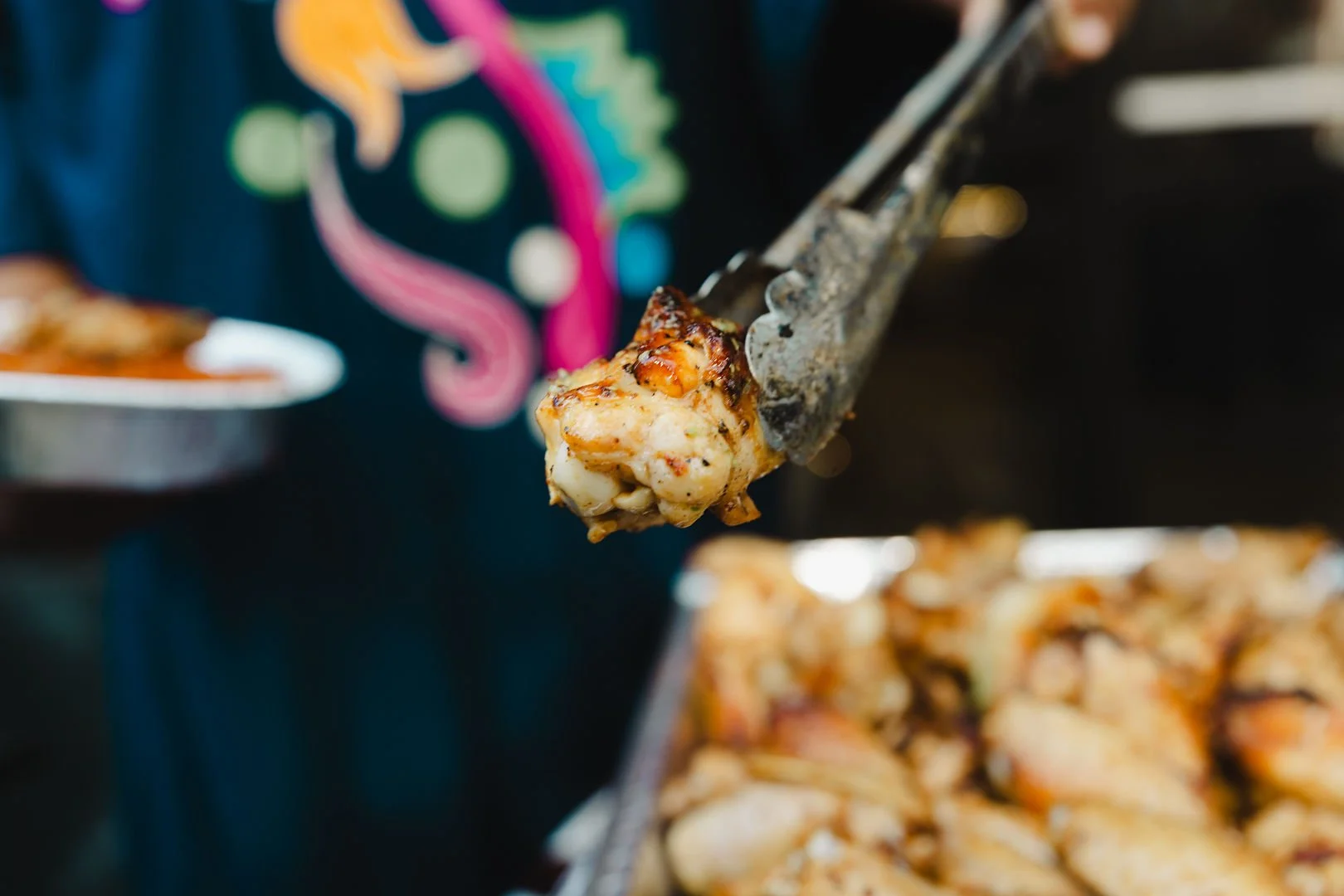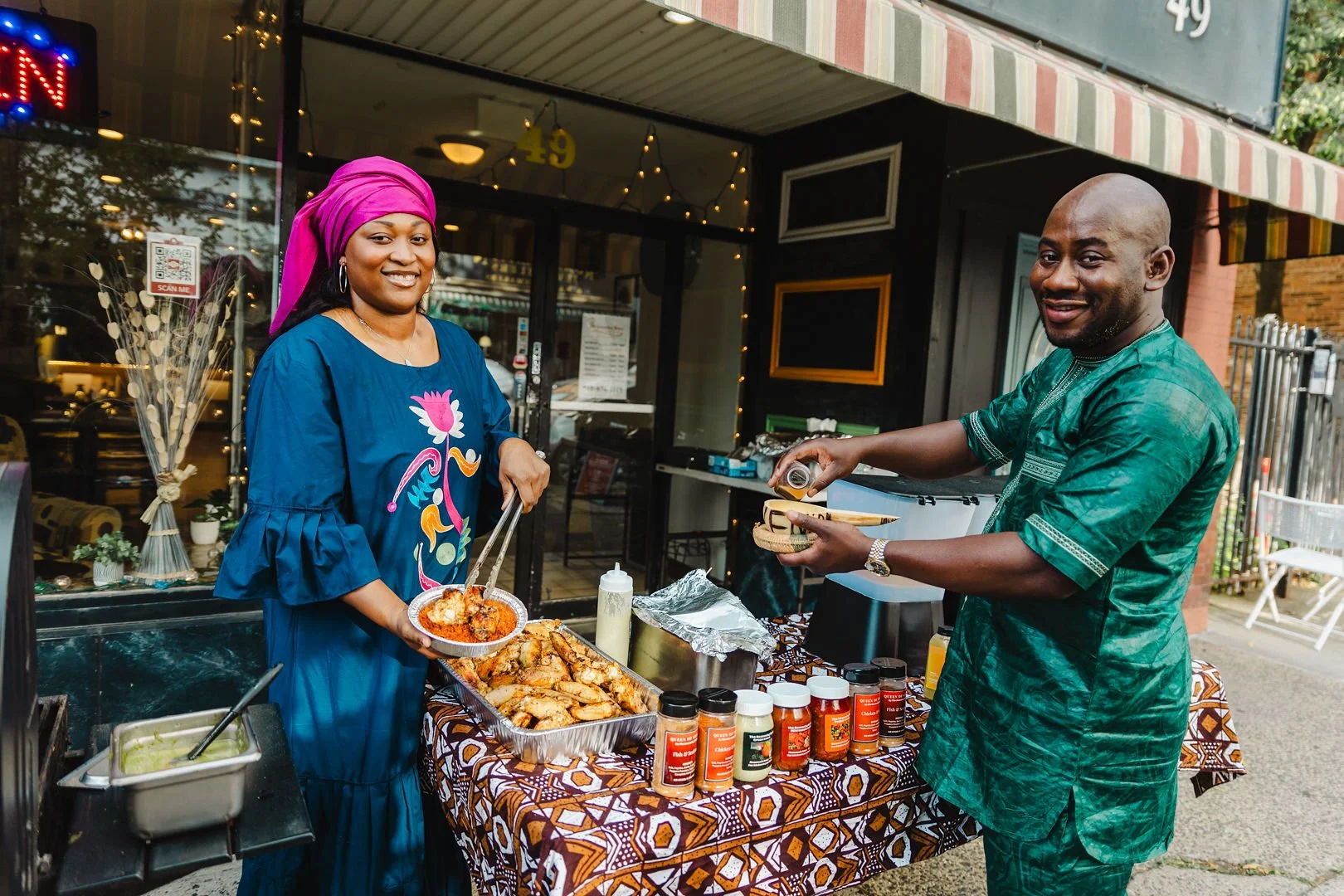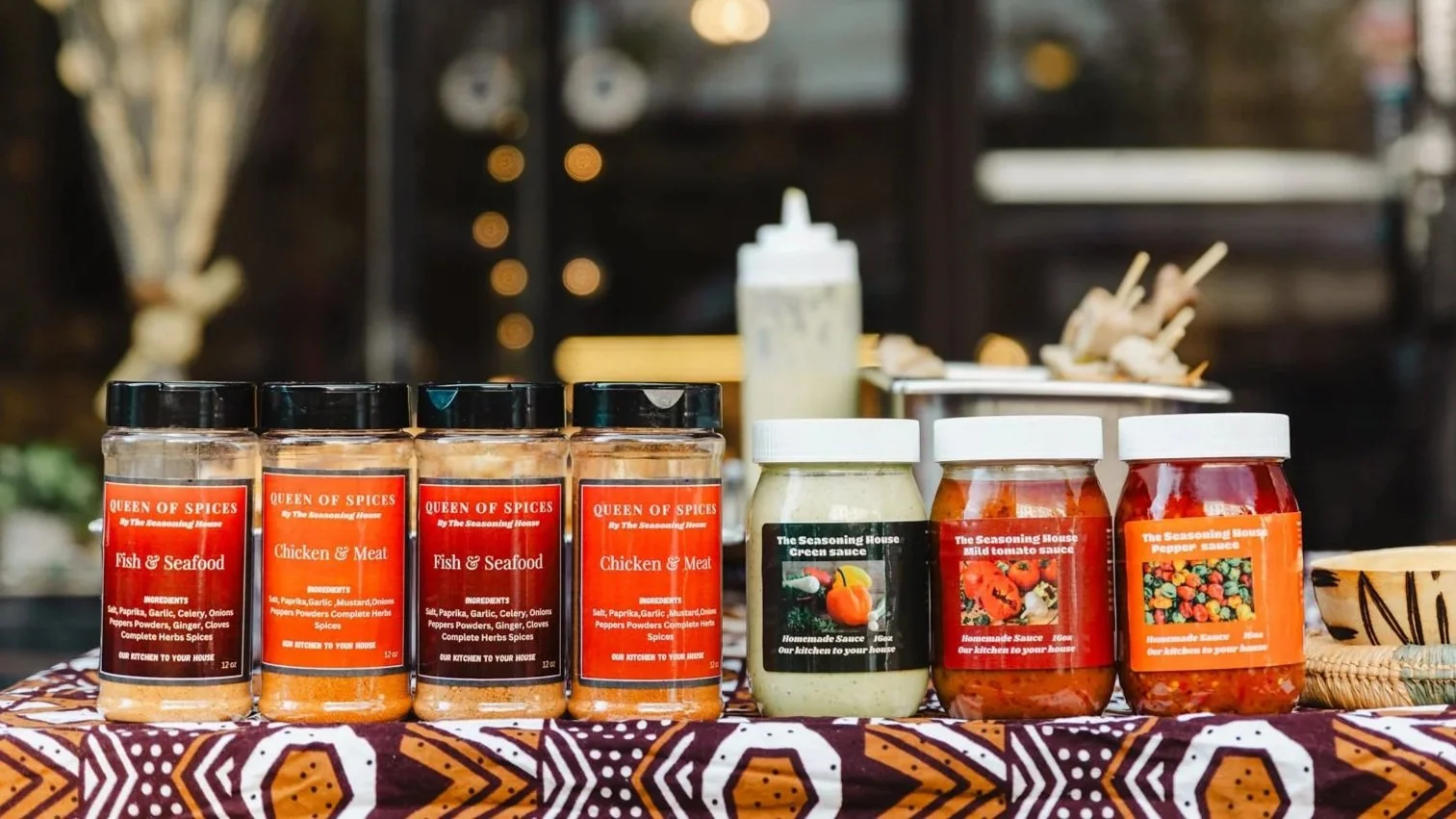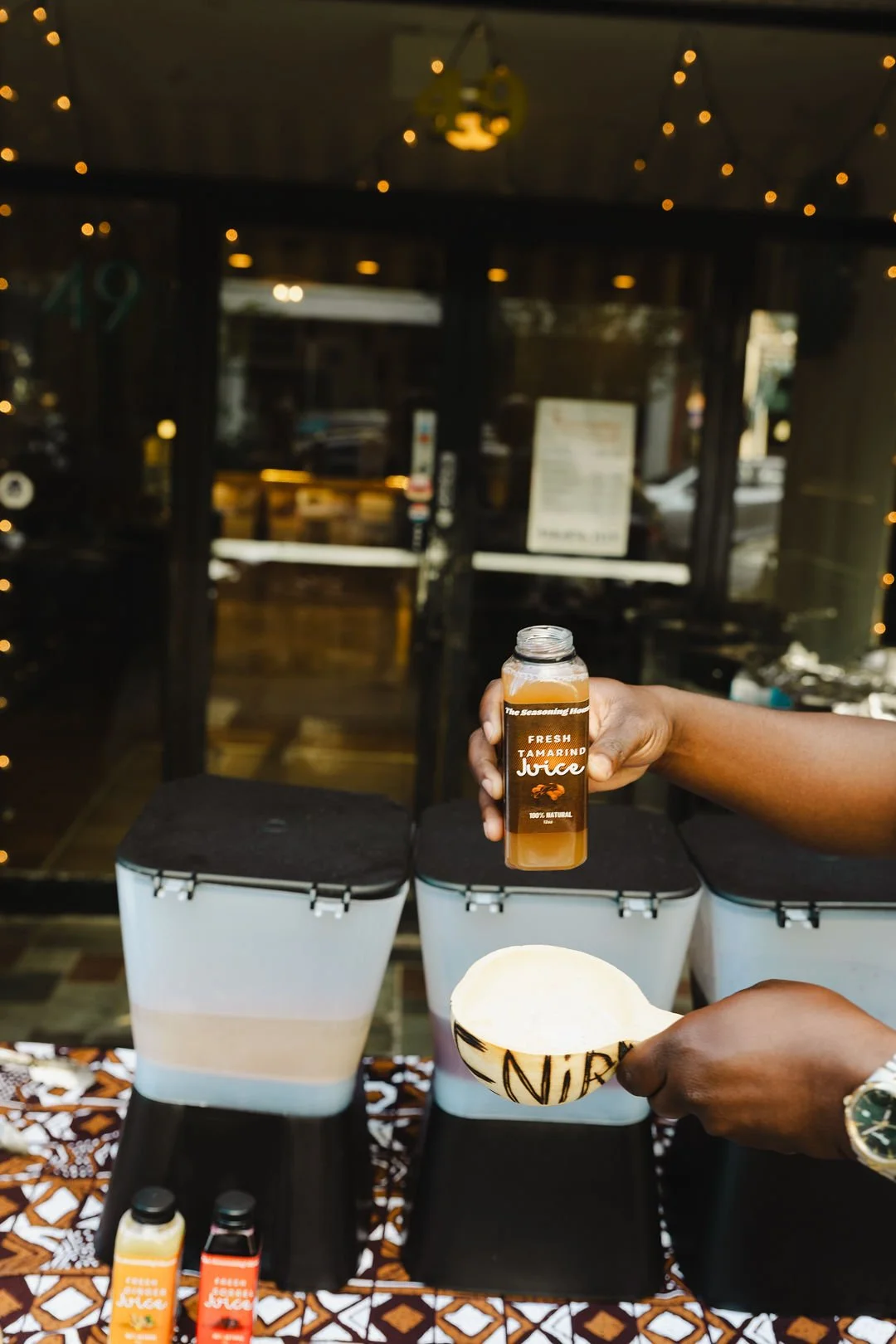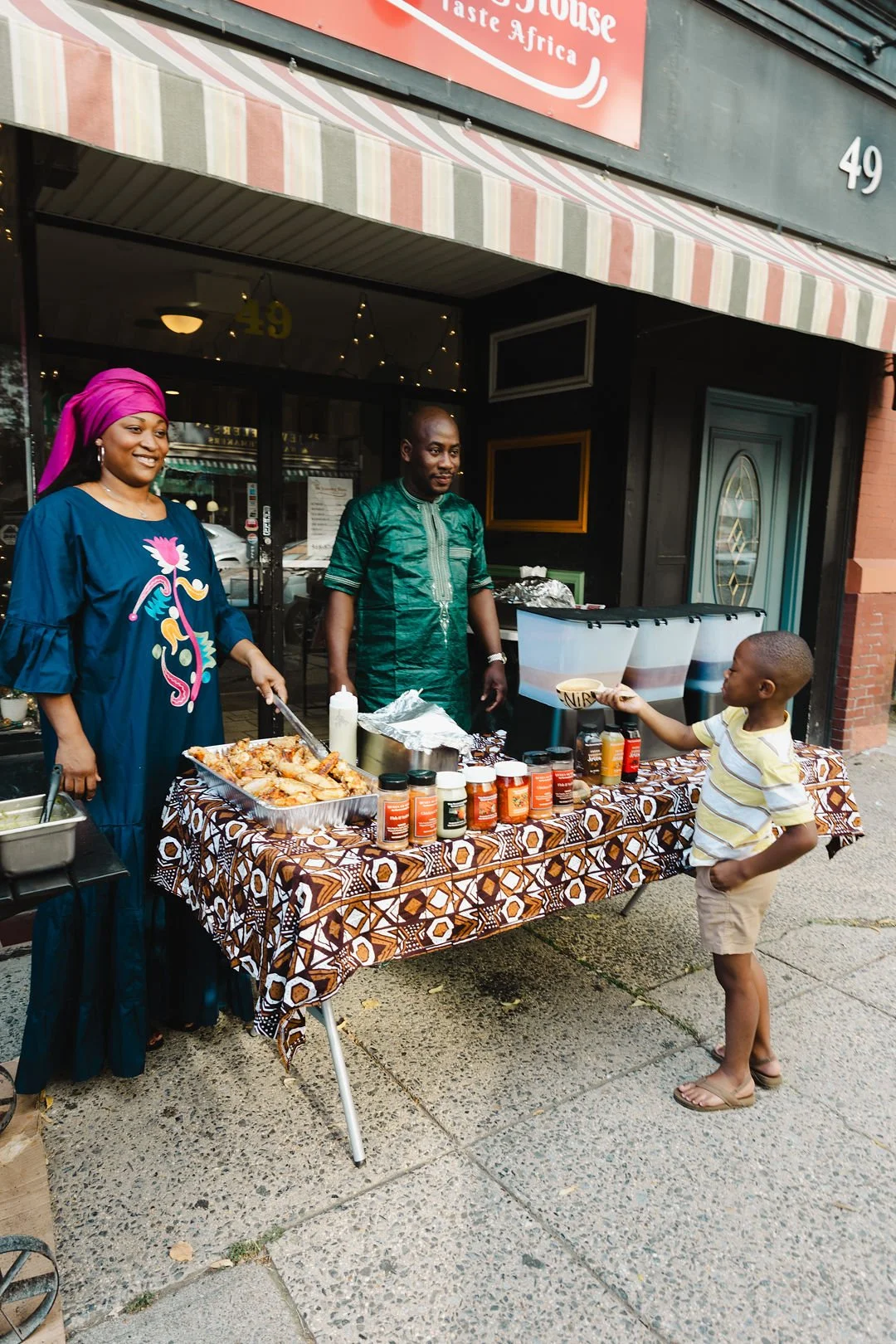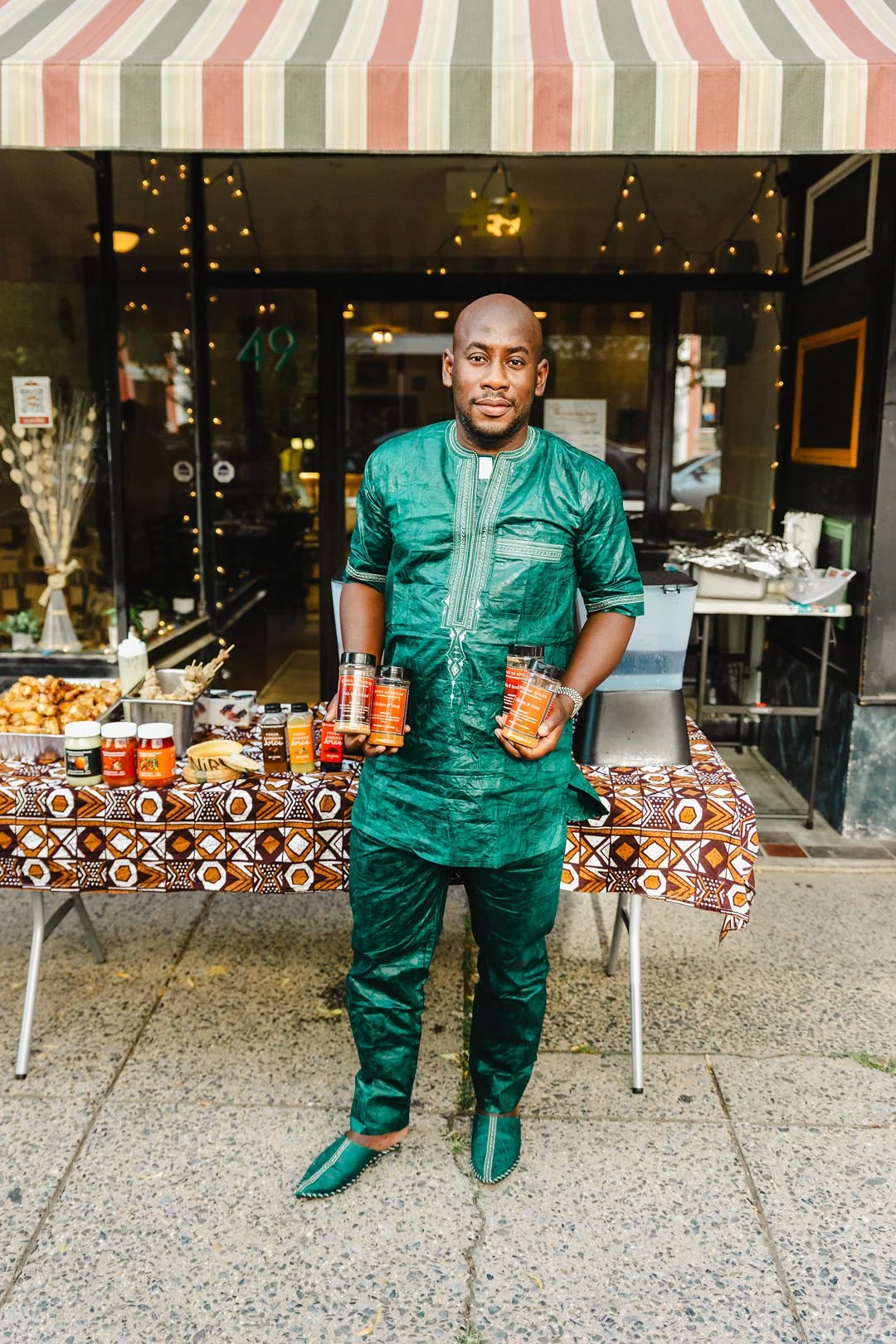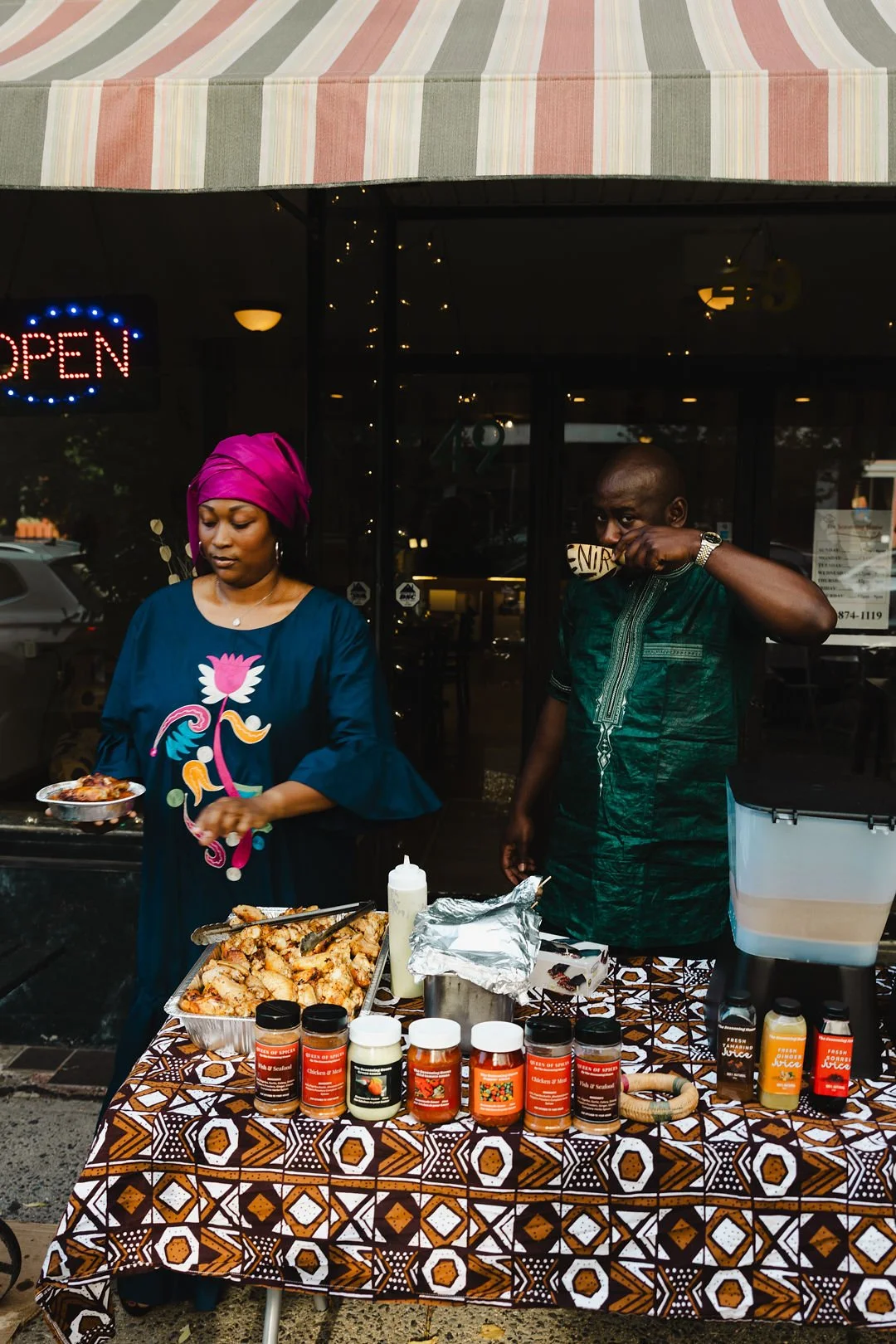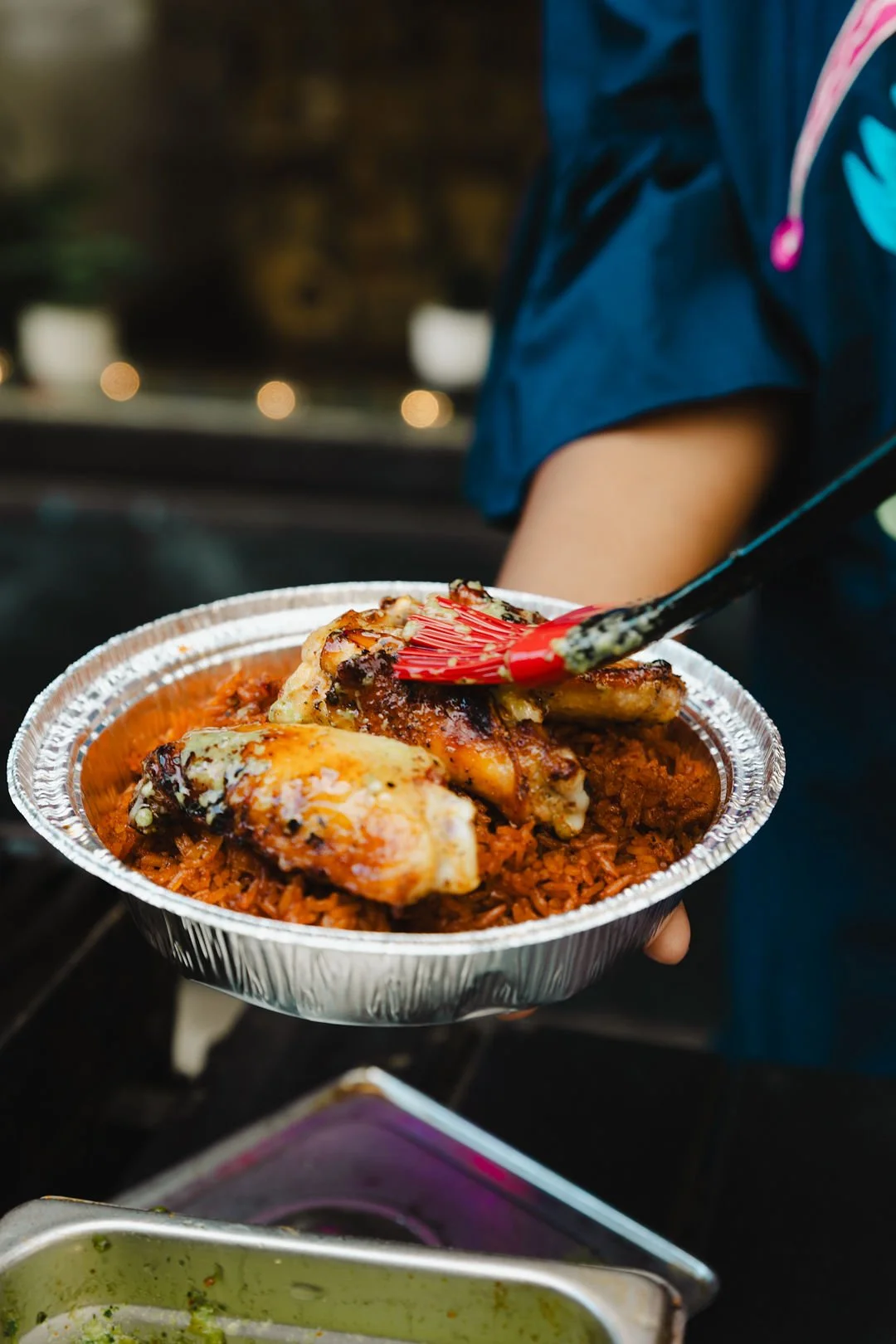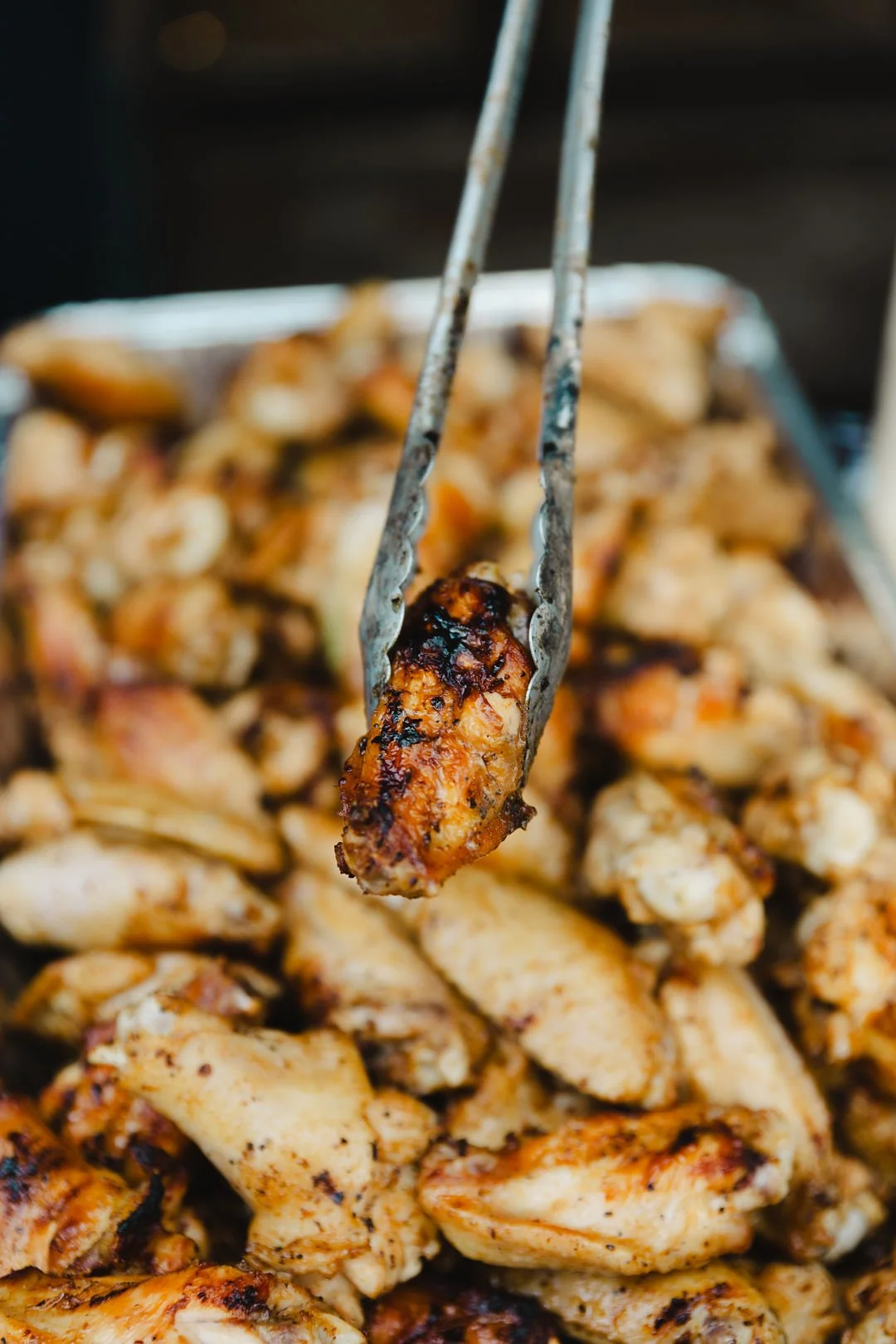MEET: RAISSA DOUMBIA + MATHIEU NIAMKE, The Seasoning House, Troy
Chef Raissa Doumbia + Mathieu Niamke of The Seasoning House talk Côte d’Ivorian flavors, cocktail culture, upstate diversity + their move to Troy.
Interview + Art Direction: Susie Davidson Powell
Photos: Konrad Odhiambo/The Dishing
Shoot location: The Seasoning House, Troy, N.Y
Tastemakers: Mathieu Niamke + Raissa Doumbia
Business: The Seasoning House, Troy | IG: @the_seasoning_house_of_troy
Hometown: Mathieu: Abidjan + Raissa: Abidjan
Current city: East Greenbush
Personal dress style at home or work: Mathieu: Casual and comfortable | Raissa: African dresses
Favorite music at home or at work: Mathieu + Raissa: Afrobeat!
Favorite spirit (or non-alc drink): Mathieu: Glenfiddich double malt whiskey 14 years old
Raissa: ginger juice
Favorite cocktail (or non-alc): Mathieu: Abidjan mix which is a drink made with vodka, fresh sorrel + triple sec. I personally like Grey Goose vodka. | Raissa: Cranberry refresher which is just cranberry juice + soda water
Favorite food: Mathieu: Kenkey and fried fish | Raissa: Cassava couscous and lamb
Most memorable bar or venue you have been to anywhere in the world: There was a rooftop lounge in Abidjan that we loved but I don’t think it’s there any more.
The Dishing talks with tastemakers in the hospitality industry + trailblazers at the intersection of food, culture + art. Today we’re talking with Mathieu Naimke and Raissa Doumbia about moving upstate, diversity in Troy and launching a new spice range.
Thanks for talking with The Dishing! We originally met when I wrote about your prior restaurant, House of Seasoning, in Pittsfield, Mass. We stayed in touch while you looked for space in the Capital Region and re-opened on 3rd Street, Troy, in the former Muddaddy Flats space. Your last restaurant was much larger, former tavern. How do you feel about the decision to move and where you are now?
Mathieu: Our Pittsfield space was beautiful, but big — almost too big for the kind of intimate, personal dining experience we wanted. Moving to Troy allowed us to be closer to a more diverse community.
You’re both from Côte d’Ivoire, Africa. You moved to Queens, then Pittsfield to open The House of Seasoning. Where did you grow up, how did you meet and did you previously work in restaurants and bars back home?
Raissa: We actually met in Ivory at a birthday party in Asinine Beach, Abidjan. Mathieu had a bar in Ivory Coast called Bar Abidjan Code Puk so he worked there and I was helping my mum cook with her catering business and working in an insurance company. Mathieu is from Koumassi and I come from Cocody — those are two different boroughs of Abidjan.
Mathieu: My mother had a restaurant when I was a little boy — I don’t remember the name now. My father was a businessman and owned a lot of properties all over Africa and rental car businesses too. He helped me with the business side of opening the bar.
What are some of your childhood memories of cooking ? Did you grow up with families who cooked a lot?
Raissa: Yes, my mum and grandmother were always cooking a lot. My mum still has her catering business.
Mathieu: And my mum had a restaurant so I kind of grew up in there.
Your menu has evolved a few times. In Troy, you added more soups for your Nigerian, Ghanaian and Senegalese customers. While there is overlap with certain dishes, how would you describe Cote d’Ivorian cuisine to someone unfamiliar with it?
Mathieu: Our Côte d’Ivorian cuisine is vibrant with a balance of savory, spicy and slightly sweet flavors. Probably the most famous dishes are cassava couscous (dhaba) and fried tuna fish. Raissa loves that. And maybe the Côte d’Ivorian sweet millet pudding dessert made with couscous and yogurt called dégué.
Your wings are famously good. Anyone that has ordered them and dunked them in Raissa’s amazing accompanying green dipping sauce know the seasoning goes through the meat to the bone. What makes the wings and sauce so good? I know Raissa hold the secrets, but come on - give us few details!
Mathieu: We marinate the wings overnight with our own blend spices, so the marinade goes deep into the meat. For the green dipping sauce, Raissa uses all different type of herbs mixed that we can get here, usually at the Troy Farmers Market. She blends and seasons it. It’s her recipe that we’re also now selling in jars. The name? [laughs] We just call it Seasoning House Green Sauce. It’s simple.
This summer you have been grilling on the street in front of your restaurant. I know that in the Ivory Coast there is a unique style of BBQ called "vertical BBQ" or "pique". Can you talk about how it differs from cooking flat on the grill?
Pique is hanging meat over the coals. Let it sit for hours so it takes it time. But when we’re cooking on the grill the heat circulates evenly,the juices drop down keeping the meat moist and the smoke gives it a rich flavor. But the meat is already seasoned before we grill. It’s marinated in wet seasoning, something like our green sauce but different.
When we spoke about clothes for our shoot, you explained that you are from two different tribes and Raissa’s traditional, formal clothing is complicated for one person to put on. Can you talk a little about your different backgrounds and family heritage?
We’re from two different tribes. Raissa’s tribe is called Dioula from the north of Cote d’Ivoire and Mathieu’s is Grand Bassam tribe from the south eastern of Ivory Coast - east of Abidjan. Raissa traditional dress is intricate with special layers and wrapping that often needs help to put on. Its a symbol of heritage and respect for special occasions.
Raissa, in my original review of the House of Seasoning for the Times Union, you refused to share any details about your spices or seasonings; Mathieu assured me you haven’t told anyone - even him - so I had to trust my palate and also took a deep dive into the recipes of the Ivory Coast. Now, you have launched your own brand of Seasoning House spices and jarred sauces. Can you describe the flavor or heat profiles or how you recommend using them?
Yes, I make my own spice blends called Queen of Spices. We are selling two kinds. They’re all-natural and packed with flavor, so you don’t need to add anything else to them. There is one that’s great for chicken and meat — it gives a rich, savory taste. And the other is perfect for fish or seafood — it adds a fresh, flavorful kick. Once you try them, you’ll see the difference. And we have our wet marinades too. How much? Oh, the dry spices are $10, the green sauce and mild sauce are both $12 and our spicy sauce is $15.
Mathieu - you previously ran a bar in your hometown of Adbijan as well as in Pittsfield. You’re also behind the new range of bottled sorrel, ginger and tamarind juices at The Seasoning House which you also sell by the glass when you’re grilling outside. Is this something you hope to distribute to stores?
Yes. We did have them in The Co Op in Albany over Juneteenth for just one week, but we’d love to get them distributed on stores shelves.
We’ve talked about how your drinks are good as cocktail mixers too. Since 2021, Nairobi in Kenya has emerged as an African city with a flourishing cocktail scene, and in 2024, Abidjan started an annual Abidjan Cocktail Week to encourage African bartenders to use local ingredients and spirits over the standard European or American brands. The same is happening in Nairobi, Kenya. With a growing cocktail culture in Africa, do you think the flavors and traditional spirits like Aphro (a palm spirit made in Ghana) is something that we will see stateside?
Yes, the Abidjan cocktail scene is growing fast and there’s a lot of creativity in the cocktail bars. In Abidjan, the villages do make traditional palm spirits, but they’re like almost house made, you know? I don’t know any that are commercially made or big enough to distribute internationally. Maybe it will come?
Our house juices work beautifully in cocktails. You can mix our sorrel with vodka, or the ginger juice with rum and tamarind with tequila. We sell the juices for $5 a bottle and while we don’t have a liquor license at this time, you can buy these bottles to mix at home.
For a while you had a Tuesday night pop up menu at your neighbor, The Lucas Confectionery. This summer you joined the Saturday farmers market in Delmar, and you offer catering services. How is business going?
The farmer’s market is great for reaching new customers and catering helps us a lot. We’re exploring more collaboration. We’d like to be able to package food for weekly lunches but would to figure out where to sell it or if we need to do ordering and drop off ourselves. But whenever we are at the Delmar Farmers Market we sell out and people see things on out menu that we didn’t bring and they say, “Mathieu, can you bring that for us next week.” [Laughs.] There is good demand.
How would you describe the last 5 years of your life since the 2020 lockdown in just 5 words?
Challenging, resilience, hope, faith, patience.
You have two children and moved your family to East Greenbush when you moved the business. How do you find life in the Capital Region compared to Queens?
Yes. Mary is 9-years old and Sean is 6-years old. They are our center of our life and motivation. Life is calmer upstate than Queens — we do miss the energy of the city but we are still breathing.
Raissa, if you were traveling, what 3 ingredients would you always have to bring with you?
My seasoning blend, dry pepper and garlic.
Restaurants and bars have all reported less foot traffic since 2020 and many offer more pop up collaborations. In your old location, you had a liquor license and did afrobeats dance parties on Sundays. Is this something you might bring to your Troy location?
Yes, we’d love to bring that energy to Troy. Music, food and dance are our culture.
I know you both work long hours, but if you get the chance to go out, or when friends come to stay, where are 3 of your favorite places to eat or drink in the Capital Region or Hudson Valley?
The Lucas Confectionery, Mojos Cafe, Liza of Troy and… can I can add one more?… Whiskey Pickle too.
Awesome. Thanks so much for talking to us. And we have some collabs coming up that I’m excited to announce too.

